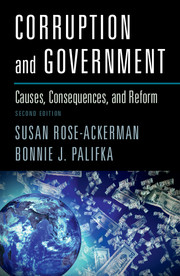Book contents
- Frontmatter
- Dedication
- Contents
- List of Figures
- List of Tables
- List of Boxes
- List of Acronyms
- Preface to the First Edition (1999)
- Preface to the Second Edition
- Acknowledgments
- INTRODUCTION
- PART I CORRUPTION AS AN ECONOMIC PROBLEM
- PART II CORRUPTION AS A CULTURAL PROBLEM
- PART III CORRUPTION AS A POLITICAL PROBLEM
- PART IV REFORM AGENDAS: DOMESTIC POLITICAL WILL AND INTERNATIONAL INFLUENCE
- 13 Domestic Conditions for Reform
- 14 The Role of the International Community
- 15 International Cooperation: States, Firms, Banks, and Organized Crime
- CONCLUSIONS
- References
- Index
15 - International Cooperation: States, Firms, Banks, and Organized Crime
from PART IV - REFORM AGENDAS: DOMESTIC POLITICAL WILL AND INTERNATIONAL INFLUENCE
Published online by Cambridge University Press: 05 March 2016
- Frontmatter
- Dedication
- Contents
- List of Figures
- List of Tables
- List of Boxes
- List of Acronyms
- Preface to the First Edition (1999)
- Preface to the Second Edition
- Acknowledgments
- INTRODUCTION
- PART I CORRUPTION AS AN ECONOMIC PROBLEM
- PART II CORRUPTION AS A CULTURAL PROBLEM
- PART III CORRUPTION AS A POLITICAL PROBLEM
- PART IV REFORM AGENDAS: DOMESTIC POLITICAL WILL AND INTERNATIONAL INFLUENCE
- 13 Domestic Conditions for Reform
- 14 The Role of the International Community
- 15 International Cooperation: States, Firms, Banks, and Organized Crime
- CONCLUSIONS
- References
- Index
Summary
International corruption is facilitated by the practices of multinational firms. However, even if such firms all pledged to refuse to make payoffs, the big business of international organized crime would remain a corrupting influence. Furthermore, money laundering not only facilitates such crime, but also smooths the way for corrupt officials to transfer their funds abroad. Policies that make it difficult for illicit funds to cross national borders and to enter the legitimate financial system are thus a key subsidiary aspect of global efforts against corruption. Explicit international efforts to constrain corruption are not sufficient. Hence, in this chapter we consider efforts to change the behavior of business firms by invoking principles of business ethics and ask how the global fight against organized crime and money laundering can indirectly limit the benefits of international corruption. Both of these initiatives have broader goals than the control of corruption per se, but they are tightly linked to the incentives for and the gains from grand corruption. Even when the United States or the European Union cannot press charges for bribery, they may prosecute foreign firms or individuals for money-laundering offenses. Many organized crime groups are international in nature, and their corrupting activities are far-reaching. To successfully disband such groups and prosecute individual members requires international cooperation.
We begin with the obligations of multinational businesses, especially large firms whose size and market power exceed that of many nation-states. Then we discuss the importance of international cooperation, outside of existing anticorruption treaties, in dealing with organized crime and money laundering.
Corruption in International Business: The Obligations of Multinational Firms
Corruption involves a buyer and a seller. It cannot properly be described as “imported” by evil multinational firms into innocent developing countries. Nevertheless, multinational firms are central actors in many large-scale corrupt deals. Anticorruption reformers have tried to enlist these firms in anticorruption efforts and to convince them to alter their own behavior. These efforts can complement other efforts to fuel growth, reduce poverty, and enhance government legitimacy, and most saliently, they can improve the overall international business climate.
We begin by discussing the corporation as an actor with moral responsibilities and argue that multinational firms should consider their obligations as international actors that exceed in size and influence some of the nations with which they deal.
- Type
- Chapter
- Information
- Corruption and GovernmentCauses, Consequences, and Reform, pp. 491 - 520Publisher: Cambridge University PressPrint publication year: 2016

